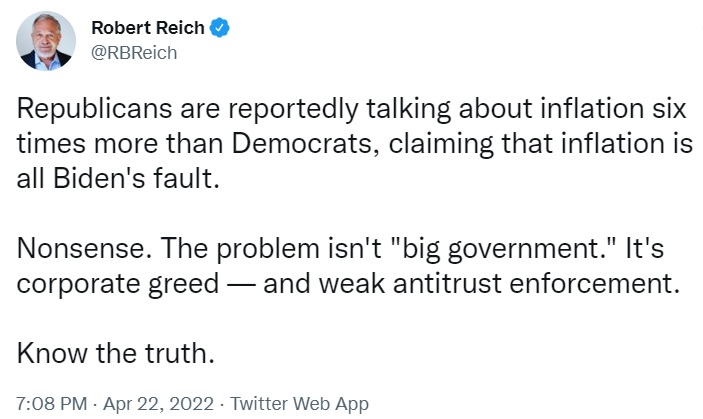Looking back on the 2008 financial crisis, it seems clear that much of that mess was caused by bad government policy, especially easy money from the Federal Reserve and housing subsidies from Fannie Mae and Freddie Mac.
Many of my left-leaning friends, by contrast, assert that “Wall Street greed” was the real culprit.
I have no problem with the notion that greed plays a role in financial markets, but people on Wall Street presumably were equally greedy in the 1980s and 1990s. So why didn’t we also have financial crises during those decades?
Isn’t it more plausible to think that one-off factors may have caused markets to go awry?
I took that trip down Memory Lane because of a rather insipid tweet from my occasional sparring partner, Robert Reich. He wants his followers to think that inflation is caused by “corporate greed.”

For what it’s worth, I agree that corporations are greedy. I’m sure that they are happy when they can charge more for their products.
But that’s hardly an explanation for today’s inflation.
After all, corporations presumably were greedy back in 2015. And in 2005. And in 1995. So why didn’t we also have high inflation those years as well?
If Reich understood economics, he could have pointed out that today’s inflation was caused by the Federal Reserve and also absolved Biden by explaining that the Fed’s big mistake occurred when Trump was in the White House.
I don’t expect Reich to believe me, so perhaps he’ll listen to Larry Summers, who also served in Bill Clinton’s cabinet.
But I won’t hold my breath.
As Don Boudreaux has explained, Reich is not a big fan of economic rigor and accuracy.
P.S. Reich also blamed antitrust policy, but we have had supposedly “weak antitrust enforcement” since the 1980s. So why did inflation wait until 2021 to appear?
P.P.S. In addition to being wrong about the cause of the 2008 crisis, my left-leaning friends also were wrong about the proper response to the crisis.
———
Image credit: Rdsmith4 | CC BY-SA 2.5.

